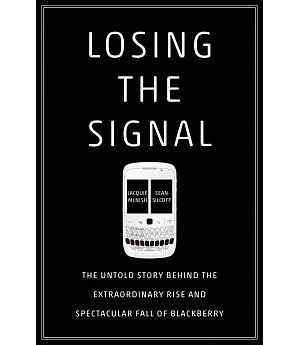今日的王者可能是明日的輸家!創新的路上岔開後就回不去了
沒有人能在2009年黑莓機市場佔有率50%時,預測到今日市佔只剩1%的局面。所有的科技公司所面臨的核心問題,可能就像黑莓機所經歷過的大起大落一樣,問題不在你做錯了什麼,而是在科技高度發展的今天,你沒做什麼決策也可能造成同樣的局面。以黑莓機面對蘋果和谷歌進入市場的短短5年為例,在黑莓機仍具有關鍵核心技術與能力時,是有機會站上巔峰的,但那不代表巔峰所帶來的營收增長及管理、人員、流程考驗都能長久安然過關。重點在於,當競爭對手挾帶強大的資金及破壞式的創新進入市場時,原有的核心技術與能力能否移轉到下一個階段並保有競爭力,才是生存的關鍵。<博客來編輯>
In 2009, BlackBerry controlled half of the smartphone market. Today that number is less than one percent. What went so wrong?
Losing the Signal is a riveting story of a company that toppled global giants before succumbing to the ruthlessly competitive forces of Silicon Valley. This is not a conventional tale of
modern business failure by fraud and greed. The rise and fall of BlackBerry reveals the dangerous speed at which innovators race along the information superhighway.
With unprecedented access to key players, senior executives, directors and competitors, Losing the Signal unveils the remarkable rise of a company that started above a bagel store in Ontario.
At the heart of the story is an unlikely partnership between a visionary engineer, Mike Lazaridis, and an abrasive Harvard Business school grad, Jim Balsillie. Together, they engineered a
pioneering pocket email device that became the tool of choice for presidents and CEOs. The partnership enjoyed only a brief moment on top of the world, however. At the very moment BlackBerry
was ranked the world's fastest growing company internal feuds and chaotic growth crippled the company as it faced its gravest test: Apple and Google's entry in to mobile phones.
Expertly told by acclaimed journalists, Jacquie McNish and Sean Silcoff, this is an entertaining, whirlwind narrative that goes behind the scenes to reveal one of the most compelling business
stories of the new century.































